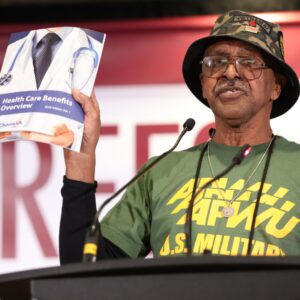March 3, 2026
Faster Decisions for Veterans
(This article appeared in the September-October 2013 edition of The American Postal Worker.)
Sue Carney, Director Human Relations Dept.
The Fully Developed Claims (FDC) program is an optional new initiative being offered by the Department of Veterans Affairs (VA) to provide faster, more accurate decisions to veterans, U.S. service members and survivors who are applying for disability compensation, pension or survivor benefits. Applicants must provide all required records and documentation and certify that they have no additional evidence to submit when filing for benefits in the accelerated process.
According to the VA, participation will not affect benefit entitlements or the attention a claim receives from rating staff. If the VA determines other records exist and are necessary to decide a claim, the claim will be removed from the program and it will be processed through the traditional claims process. Once an FDC is initiated, applicants are permitted one year to gather evidence before being required to complete the claim submission process. Approved claims will be paid retroactively to the day the claim was initiated.
FDCs can be filed electronically by opening an account at eBenefits.va.gov or by completing VA Form 21- 526EZ and visiting a local Regional Office. The VA recommends all applicants appoint an accredited Veterans Service Officer to help them gather the required medical records and evidence, and to assist with claim initiation and submission.
To ensure FDCs are filed correctly, the VA has developed a checklist to aid individuals seeking disability compensation. Filers should be prepared to share information regarding Social Security disability benefits and arrange to submit or disclose the location of private and military medical records, including the date ranges of treatment and any relevant military personnel records, such as DD-214. Providing statements from family, friends, clergy, law enforcement and/or letters from fellow service members (buddy statements) that attest to how and when a condition occurred are extremely useful in proving the substance of a claim.
To facilitate claim approval, it’s important to know the many different claim types and the evidence that’s required for each.
Types of Claims
Original claims are for first-time filers whereas new claims are for all other claims that have not been previously filed. Either claim can be submitted any time after military discharge. Both claims require medical evidence supporting the presence of a current physical or mental disability; evidence of an in-service event, injury or disease; and evidence that a link exists between the current disability and the event, injury, or disease. Medical records or medical opinions are usually required to establish this relationship.
Current medical documentation demonstrating that an accepted service-connected disability has worsened is needed to claim an increased disability rating. To establish that a secondary disability claim is warranted, the veteran must provide medical documentation that supports that the disability was caused or aggravated by a service connected disability. To prove anunemployabilty claim exists, veterans must demonstrate through medical evidence that a service-connected disability prevents them from obtaining or maintaining substantially gainful employment. They must also complete VA Form 21- 8940, and have VA Form 21-4192 completed by their last employer.
To make a Post-Traumatic Stress Disorder claim VA Form 21-0781, or 21-0781a, must be filed with probative medical documentation.
Veterans can reopen claims provided there is new material evidence for the VA to consider and at least one year has lapsed since receiving a denied decision that has not been appealed.
Veterans are given more control over their claims and can speed the process by using Disability Benefits Questionnaires (DBQs). Each of the more than 70 forms, completed by private healthcare providers, captures essential information specific to the claimed condition to help specialists evaluate disability compensation and pension claims.
To learn more visit www.benefits.va.gov/fdc and www. benefits.va.gov/compensation or call the Department of Veterans Affairs Telephone Assistance Service at 1-800- 827-1000.


